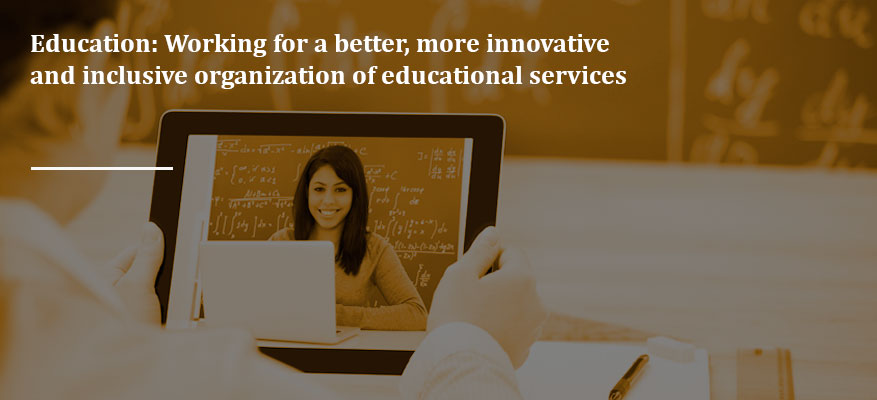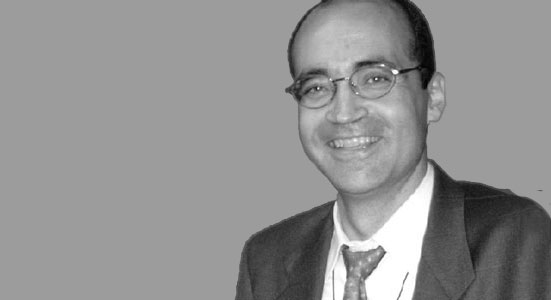Education

The rationale
- Education is essential for economic and social development. Educational systems need to adapt to new societal challenges by adopting recent technologies and promoting more inclusive and efficient approaches.
How to address the challenges
- Understanding how educational systems work and perform.
- Determining to what extent educational service provision is efficient and inclusive and how to improve it through innovation and accountability.
- Launching pilot programs for educational service innovation and e-learning.
The Challenges
- Orienting educational systems to societal challenges by taking advantage of innovative technologies and e-learning.
- Different countries have different educational systems, but all are willing to provide universal high-quality educational services at reasonable costs.
- The organization of education service provision must adapt to the real needs of the population, particularly those with incomplete education or school failures.
Our products
- Diagnosis on the state and potential of innovation in education.
- MOOCs, diagnosis, market research and implementation.
- E-learning and social networks in education.
- Efficiency of educational systems.
- International benchmarking and best practices.
- Expert advice for education policies.

Luis RubalcabaDirector
Professor of Economic Policy, Department of Economics and Business Administration, University of Alcalá. Previous academic positions include: visiting Fulbright Schuman Scholar at Boston University, (US), distinguished professor at VTT-Tekes (Finland), honorary scholar at the University of Birmingham (UK) and president of the RESER scientific association (European Association for Services Research). Staff positions at international institutions: The World Bank Group, Washington, DC, USA (2012-2016, specialist within the Trade and Competitiveness Global Practice) and European Commission, Brussels, Belgium (2002-2004; policy officer in DG Enterprise and Industry – previously, analyst at Eurostat based in Luxembourg, 1989-1990). He has led projects for some EU governments, business organizations and well as for the European Commission, the OECD, the United Nations, the Inter-American Development Bank and the World Bank Group. In developing economies, he has been working in countries such as Ecuador, Uruguay, Kazakhstan, Dominican Republic, Jordan, and Jamaica. He has published in more than 100 international publications on services.
SELECTED PUBLICATIONS & REPORTS
- Mancera, D.T. and Saldaña, D.G., 2014. Los MOOCs y su papel en la creación de comunidades de aprendizaje y participación. RIED: revista iberoamericana de educación a distancia, 17(1), pp.13-34.
- Santos, J.L., Klerkx, J., Duval, E., Gago, D. and Rodríguez, L., 2014, March. Success, activity and drop-outs in MOOCs an exploratory study on the UNED COMA courses. In Proceedings of the Fourth International Conference on Learning Analytics and Knowledge (pp. 98-102). ACM.
- Montes, O. and Rubalcaba, L. (2014) Human or Technological Resources in XXI Century Schools: An Empirical Analysis, Working Paper. Presented in the XXIV Annual Conference of the European Association for Research on Services (RESER), Helsinki (Finland), September 2014.
- Montes, O. and Rubalcaba, L. (2014). School choice, equity and efficiency: International evidence from PISA-2012. Investigaciones de Economía de la Educación, Volume 9, 2014
- Montes, O., Gallouj, F. and Rubalcaba, L. (2013). (Social) innovation in education: Theoretical framework and international evidence, Working Paper. Presented in the Workshop on Social Innovation CLERSE/University of Lille1, Lille (France), December, 2013
- Rubalcaba, L. (2013). Analytical framework for service and social innovation in education and the role of communities. Working paper, Boston University (mimeo)
- Montes, O. and Rubalcaba, L. (2013). Empowering Principals, Teachers or Parents: Who makes a difference in education?. Working Paper. Presented in the XXXVIII Annual Conference of the “Simposio de Economía” of the Spanish Economic Association (SAEe), Santander (Spain), December 2013.
- Martin, S., Castro, M., Gago, D. and Torres, D., 2013, August. Empowering communities on line: A Massive Open Online Community on App Development and Entrepreneurship. In Teaching, Assessment and Learning for Engineering (TALE), 2013 IEEE International Conference on (pp. 37-40). IEEE.
- De Jorge Moreno, J. 2012. Using social network and dropbox in blended learning: An application to university education. Business, Management and Education, (2), pp.220-231.
- De Jorge-Moreno, J, Laborda, L and Sanz-Triguero, M (2012). The effect of business and economics education programs on student´s entrepreneurial intention. European Journal Training and Development.36, 235-247.
- De Jorge Moreno, J. and González, D.S., 2010. Determinantes de la eficiencia educativa en la Unión Europea. Hacienda pública española, (193), pp.131-155.
